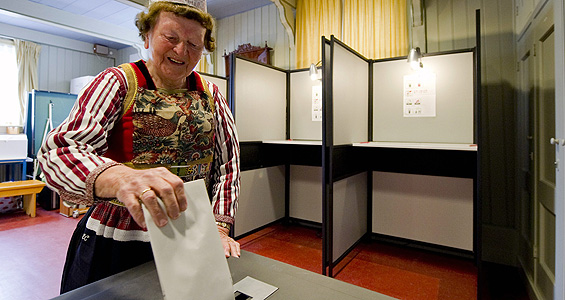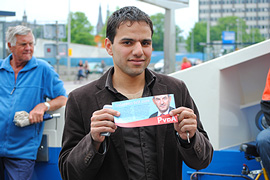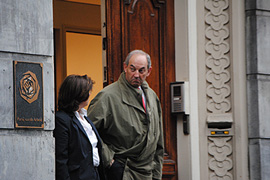The Netherlands decides its fate
The financial crisis and Muslim immigration bring Dutch voters to the polls.
![amsterdam at night [makary]](/wp-content/uploads/2010/06/201069193824116621_2.jpeg?resize=270%2C180&quality=80)
 |
| Dutch elections mark the eurozone’s first since the collapse of the Greek economy [AFP] |
Like so many days in Amsterdam, this election day was filled with spurts of on-again, off-again rain, the kind that the Dutch have grown accustomed to for centuries.
What they have not grown accustomed to is a multicultural society, which is a phenomenon that has developed since the end of the Second World War. But for the first time in this nation’s history, a Jewish man, albeit a secular one, is on the verge of becoming the next prime minister.
That man is Job Cohen, who was until recently the Mayor of Amsterdam, and represents the top of the ticket for the PvdA, a left-leaning labour party.
Cohen is at the end of a long battle to run the country that began in February when the PvdA backed out of the ruling coalition government because it did not want to send Dutch troops back to Afghanistan.
But two major issues are dominating this election – the economy and immigration – specifically immigration from the Muslim world.
The Wilders effect
It is certainly notable that during the past month or two, the immigration issue was supplanted from the top spot, and many centrist and left-leaning Dutch people see this as a blessing because the immigration issue has fueled the Netherlands’ far-right parties.
| in depth | |||||
|
According to many Dutch polls, Geert Wilders, the radical anti-immigration and anti-Muslim leader of the far-right PVV (Party of Freedom) lost significant electoral support as Europe’s economy slumped.
This is because as a one-issue candidate he really didn’t have much to say about the economy, which is on everyone’s minds these days. It is inevitable that the next Prime Minister and government will have to make serious cuts to the Dutch welfare state’s spending.
“It’s getting a bit scary because people are focusing on single issues. Geert Wilders focuses on immigration” Evelien van der Molen, 22, a political science student at the University of Amsterdam, said.
“The politicians are focusing on feelings and heightening voters’ emotions. They don’t talk about things that they don’t want to talk about. I think Wilders will get 15 seats in parliament, but he’s crazy”.
Though the major parties in the Netherlands support raising the retirement age from 65 to 67 in the wake of the current financial crisis, Wilders staunchly opposes this policy.
James Paul Janse, 23, a sociology student at the same university, told Al Jazeera: “We are a trading nation, so you can’t fix the economy on your own. But raising the retirement age to 67 is a big issue.”
Janse feels that Wilders’ support lies in the lower socio-economic classes because “they feel that the government is too elitist and doesn’t listen to them.”
Janse believes that some individuals feel that their vote can only have tangible results and make a difference if they vote for Wilders whose ideology differs greatly from the rest of the candidates.
A Muslim and a Jew
Ali El Amraoui, 29, of Amsterdam, who teaches high school economics and has Moroccan-born parents, said: “Wilders is a fool because he hates people. I’m voting for PvdA because it doesn’t matter if you are Muslim, Christian, Jewish or Hindu.
 |
| Amraoui represents how many Dutch Muslims feel about the elections [Morse] |
“I don’t look at whether Cohen is a Jew, I look at him as a person who wants the best for his country and he wants everybody to get a fair chance. I agree with that philosophy.”
Cohen can claim a significant amount of support from the Netherlands Muslim minority, who make up 5 per cent of the population (approximately 850,000 people), because of his calm and collected reaction to the murder of anti-Islam filmmaker Theo van Gogh, who was assassinated by a Dutch-Moroccan Muslim on the streets of Amsterdam in 2004.
Cohen’s decision to thoughtfully engage Amsterdam’s Muslim community, rather than making them pariahs, earned him the reputation of a peace-maker who handles crises with fierce responsibility, all while maintaining a steadfast belief in reconciliation and coexistence.
Roland de Jongste, from the suburbs of Utrecht, said: “The number one issue in this election is that everybody counts.”
These final two words are the campaign slogan of Cohen and the PdvA party that he leads. De Jongste worries, “You can’t reduce costs by taking away the livelihood of handicapped people. I think the economy will be okay. We are already a rich country.”
Though Cohen’s PvdA and Wilders’ PVV are getting most of the attention from the press, another party called the VVD (People’s Party for Freedom and Democracy) which is a center-right party that supports boosting the Dutch economy through more free market principals and other economic liberalization techniques, was the leader in most Dutch polls in previous weeks.
Debt relation
This party’s popularity directly correlates with the heightening of the European debt crisis.
 |
|
Cohen, a Jew who reaches out to Muslims, could be the country’s next prime minister [Morse] |
The inclement weather didn’t deter hundreds of thousands of Dutch citizens from going to the polls to cast their ballots in this contentious parliamentary election.
Peter Kuijmans, a civil servant who was responsible for running the polling station at Amsterdam’s Centraal Station, claimed that by 15:30GMT, the number of voters surpassed the level of voters in the 2006 elections.
By 16:00 GMT, at least 2,000 people had voted at his polling station and he wasn’t sure if he would need to order additional ballots to supplement the 2,400 paper ballots he was given.
Kuijmans expects to be home by 01:00 GMT at the earliest, and after two elections where computer balloting was used, the Dutch have returned to paper-ballots this year because of past technological glitches.
Though election violence has never been a problem in the Netherlands, a strong victory for Wilders’ PVV party is likely the only outcome that can rattle this newly multicultural society.
Stephen Robert Morse is a graduate of the University of Pennsylvania and an Erasmus Mundus scholar studying journalism in Europe.
The views expressed in this article are the author’s own and do not necessarily reflect Al Jazeera’s editorial policy.
